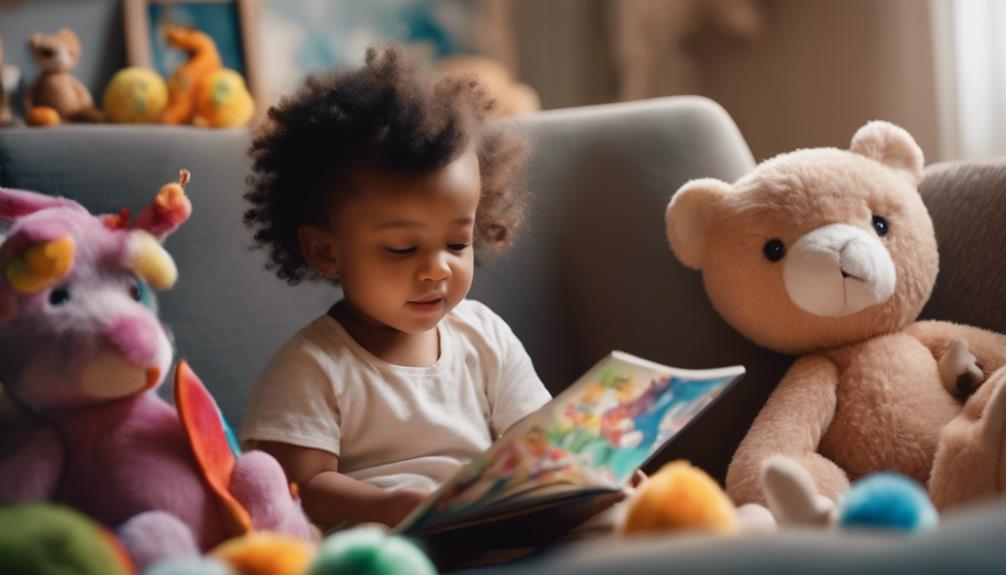Reading to your baby is crucial for their cognitive development, language skills, and emotional bond with you. It boosts brain activity, enhances neural connections, and improves language understanding. This habit promotes effective communication, inspires curiosity, and expands vocabulary. Additionally, it nurtures creativity, sharpens critical thinking, and lengthens attention span. By involving your baby in stories, you establish a positive connection with books, nurture a passion for learning, and pave the way for academic achievements. Delve deeper to uncover the numerous advantages that reading to your baby offers.
Key Takeaways
- Builds lifelong literacy skills and academic success.
- Enhances parent-child bonding and communication.
- Stimulates cognitive development and creativity.
- Fosters language skills and enhances vocabulary.
- Nurtures a love for learning and reading.
Importance of Early Reading
Reading to your baby from an early age sets the stage for lifelong literacy skills and academic success. Introducing books and reading to your little one not only fosters language skills but also enhances parent-child bonding. Through the shared experience of reading together, a significant foundation for communication skills is established.
As you read to your baby, they aren't only exposed to new words and concepts but also begin to grasp the nuances of pronunciation and comprehension in spoken language.
Moreover, early exposure to books stimulates cognitive development in children, igniting their imagination and creativity. The act of reading aloud to your baby plays an important role in shaping their ability to think critically and problem-solve.
Programs like United Way's Imagination Library, which provide free books to promote early reading, further emphasize the importance of instilling a love for learning in young minds. By engaging in early reading practices, you're setting your child on a path towards academic success and a lifelong appreciation for the written word.
Cognitive Development Benefits

Enhancing your baby's cognitive development through early exposure to reading is a powerful way to lay the foundation for their future learning and problem-solving skills. Regular reading sessions not only stimulate brain activity but also promote neural connections, leading to improved language comprehension and cognitive skills as your baby grows.
These reading sessions aid in memory retention and enhance cognitive processing abilities, contributing to increased attention span, critical thinking skills, and problem-solving abilities in the long run. Studies have consistently shown that babies who are read to regularly exhibit higher levels of cognitive development compared to those who are not.
Parent-Child Bonding

Reading to your baby not only enhances the emotional connection between you but also promotes attachment and security.
By engaging in shared reading activities, you can strengthen the parent-child relationship through meaningful interactions.
These one-on-one sessions foster intimacy and trust, creating a sense of continuity in your infant's routine.
Enhances Emotional Connection
When engaging in this activity, parents can strengthen their emotional connection with their babies. Reading to your little one enhances the parent-child bond by creating shared experiences that foster intimacy and security.
As you read to your baby, they begin to associate the sound of your voice with comfort and love, building a sense of trust in your relationship. This shared activity not only deepens your emotional connection but also allows for meaningful conversations, where you can explore real-life issues and emotions in a safe and nurturing environment.
Through these discussions during reading time, you have the opportunity to bond with your baby on a deeper level, enhancing the overall emotional connection between you and your child.
Promotes Attachment and Security
Engage in regular reading sessions with your baby to establish a strong sense of attachment and security in your parent-child bond. When you read to your baby, you create a special bonding time that goes beyond just sharing a story. These shared reading experiences help deepen your relationship with your little one, fostering intimacy, trust, and continuity in their life.
The one-on-one interaction during reading not only enhances the emotional connection between you and your baby but also promotes a more essential attachment. Research shows that reading aloud to babies plays an essential role in strengthening the parent-child bond. Through these reading sessions, you aren't just imparting language skills but also building a foundation of security and attachment that will benefit your child in the long run.
Strengthens Parent-Child Relationship
Creating a special and intimate time for connection and shared experiences, reading aloud to babies strengthens the parent-child bond in a significant manner. Through the act of reading together, parents and babies build emotional closeness, trust, and attachment. Research indicates that engaging in shared reading activities fosters a sense of security, comfort, and predictability for babies, thereby promoting a healthy parent-child relationship. These positive interactions during reading sessions contribute to a strong parent-child bond by enhancing communication and responsiveness.
Regular reading sessions with babies can have long-term benefits, such as improved social and emotional development. The nurturing relationship formed during these shared experiences lays a foundation for a secure attachment, which is essential for a child's overall well-being. By investing time in reading aloud, parents not only provide cognitive stimulation but also cultivate a deeper connection with their child, fostering a positive environment for growth and development.
Stimulating Imagination and Creativity

By reading to babies, you ignite their imagination and nurture creativity through exposure to diverse stories and characters. Reading aloud stimulates their cognitive development, allowing them to explore new ideas and concepts that spark curiosity.
As babies engage with various narratives, they learn to visualize and create mental images, enhancing their ability to think creatively. Diverse storytelling styles and characters provide a rich tapestry for their imagination to flourish, encouraging them to explore different perspectives and scenarios.
Through the love for storytelling instilled from an early age, reading to babies can inspire a lifelong appreciation for creativity. This early exposure to language development and imaginative tales not only benefits their cognitive growth but also fosters a creative mindset that can extend into various aspects of their lives.
Communication and Exploration

Reading to babies regularly enhances their communication skills and encourages their exploration of the world through various stimuli. By exposing infants to the cadence and rhythm of language, reading sessions play an essential role in fostering effective communication.
Additionally, engaging with books, pictures, and textures during reading time sparks curiosity and promotes active exploration in babies, contributing to their cognitive development. Through shared activities like reading, parents and babies form strong bonds, establishing a sense of security and trust.
Moreover, regular exposure to reading materials aids in vocabulary acquisition and enhances reading skills, ultimately expanding the infant's understanding of the world. Studies have shown that babies who are read to frequently exhibit improved language development and show enhanced cognitive abilities.
Incorporating reading sessions into your routine not only nurtures communication skills but also encourages exploration, contributing to a well-rounded developmental experience for your baby.
Language Development Benefits

How does reading to babies positively impact their language development? When you read to your baby, you are not only creating a bonding experience but also helping them develop essential language skills. Babies start learning to read long before they can actually decipher words on a page. By exposing them to books and spoken language, you are laying the foundation for the skills they need to become proficient readers later in life.
Here's a breakdown of how reading to babies benefits their language development:
| Benefits of Reading to Babies | Impact on Language Development |
|---|---|
| Helps babies learn the sounds of language | Enhances their ability to recognize speech patterns |
| Introduces babies to a variety of words by age | Increases the vocabulary they are likely to learn |
| Engages babies in stories that make reading enjoyable | Fosters a positive association with books and learning |
Through reading to your baby, you are not only nurturing a love for books but also nurturing their language skills, setting them up for success in the future.
Cultivating a Love for Learning

In order to foster a love for learning in babies, exposing them to books early on is essential for their academic success and future curiosity. Reading to babies not only helps in developing their language skills but also cultivates a deep-seated passion for learning. Studies have shown that regular exposure to reading at a young age instills a greater interest in books and education as children grow.
By engaging babies in reading, parents lay the groundwork for a lifelong enthusiasm for acquiring knowledge. Through this early exposure, positive associations are formed with the learning experience, making it enjoyable from the start. Establishing a routine of reading to babies can have a profound impact on their attitude towards learning, fostering a natural curiosity for the world around them.
Frequently Asked Questions
Why Is It Important to Read to Babies?
Reading to babies is essential for brain development and literacy skills. It fosters bonding, communication, and a love for learning. Start from birth to build a strong foundation. Reading regularly to babies enhances their cognitive abilities and emotional growth.
Why Is Reading Important During Pregnancy?
Reading during pregnancy matters because it enhances bonding, with studies showing babies even remember stories from the womb. It reduces stress and sets the stage for a love of reading, benefiting both you and your baby.
Why Is It Important to Read to a Child Often?
Reading to a child often is important because it boosts language skills, fosters imagination, and nurtures a love for books. It helps in early communication development, expands vocabulary, and lays a strong foundation for future academic success.
When Should You Start Reading Books to Your Baby?
Wondering when to start reading to your baby? Start reading to your little one from birth. Those early moments are perfect for bonding, relaxation, and introducing your baby to the joy of storytelling.
Conclusion
To sum up, the benefits of reading to your baby are undeniable.
As the renowned author Dr. Seuss once said, 'The more that you read, the more things you'll know. The more that you learn, the more places you'll go.'
By taking the time to read to your little one, you aren't only fostering their cognitive development but also creating a stronger bond with them that will last a lifetime.
So grab a book and start reading today!










